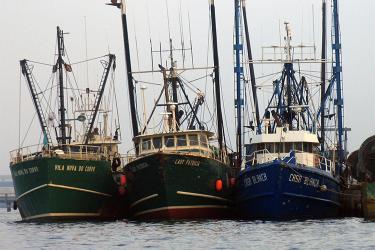Where did you grow up?
I grew up in Kansas City, Missouri which is about as far away from the ocean as you can get in the continental U.S.
Where did you go to school and in what subject did you get your degree(s)?
For my undergraduate studies, I got a dual marine science and biology degree with a minor in chemistry at the University of Miami. Then, I received my Master’s of Science in marine science from the Virginia Institute of Marine Science at the College of William & Mary. For my Doctorate degree I went to the University of South Carolina - Columbia (the real USC, sorry, Southern California, we came first) in marine science.
How did you come to work at the Southeast Fisheries Science Center?
I started as a postdoc at University of Miami’s Cooperative Institute for Marine and Atmospheric Studies and was recently promoted to assistant scientist. This is my first “real job” after finishing my Ph.D. Before my graduate studies, I worked as a fisheries observer for 6 years with the reef fish and shrimp observer program for the center based out of Galveston, Texas. Working for my alma mater and with the Southeast Fisheries Science Center is like a dual homecoming for me.
What do you do at the science center?
I am part of the team that works on the Gulf of Mexico Integrated Ecosystem Assessment program. I have three interrelated projects:
- Collaborative water quality monitoring in Southwest Florida with commercial fishermen
- Ecosystem impacts of red tides including hypoxia or low dissolved oxygen
- Updating a satellite-based index of red tide for use in fishery stock assessments
What do you like most about your position?
I really like the interdisciplinary nature of the work and collaborations. I get to work with fisheries biologists, physical oceanographers, social scientists, economists, plus commercial and recreational fishermen. My work varies greatly including technical data analyses, phone calls with fishermen, virtual meetings with social scientists and ecosystem modelers. We are working on implementing a cutting-edge ecosystem-based fisheries management system in the region. What’s not to like about it?
What advice would you have for someone interested in a career at NOAA Fisheries?
Math and science are pretty important, but equally important is effective communication. I don’t claim to be a master at communication, but poor communication skills can make or break an opportunity. Also consider becoming a fisheries observer.
Is there a book, quote, or person that influenced you to be the person that you are today? Tell us why.
My parents and grandparents were very supportive of my ocean obsession. Without their encouragement, I probably would not be where I am today.
What do you like to do outside of work?
I spend all day in front of a computer, so I like to get outside. Hiking, biking, canoeing, cross-country skiing, snow-shoeing, and camping are my favorites. I currently work remotely from Wisconsin, so winter sports are a must to combat cabin fever.





